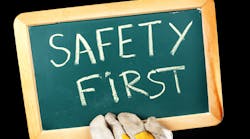In May, an explosion at a chemical plant in Porto Marghera, near Venice, Italy, sent clouds of black smoke and flames into the immediate area, injuring two workers and prompting authorities to order residents to shelter in place. Earlier in the month, styrene leaked from a storage tank in Visakhapatnam, India, when workers were restarting operations after shutting down for COVID-19, causing 11 deaths and forcing hundreds in the surrounding area to be hospitalized. The following month saw a fire erupt at a plant in the U.K., and though it resulted in no injuries to workers, the facility had to shut down for five days.
These are just a few examples of safety incidents that have occurred around the world in the past few months. It seems that as companies scrambled to address the health risks of COVID-19 in their workplaces, they have not paid enough attention to other safety risks. Companies need to refocus their attention and ensure all safety risks are managed within the context of the COVID-19 reality.
Risk Accelerators
The emergence of the COVID-19 pandemic has prompted most, if not all, companies to refocus their priorities on ensuring that workplace infection is prevented. But as companies adapted new policies and procedures, and implemented additional measures, other risks were not being adequately managed. The decisions made in response to COVID-19 and the attention demanded by the pandemic have accelerated other risks that have always been present, particularly safety risks. These risk accelerators have had serious consequences to companies’ bottom lines, employee safety and surrounding communities.
Figure 1 offers a look at the most commonly cited risk accelerators. Some of these are consequentially related. For example, many companies turned their attention to cost reductions and cash conservation as the economic fallout of the pandemic escalated. The result has typically been a decision to delay maintenance.
The impact of the pandemic on companies’ financial performance has also put tremendous pressure on those that shut down to restart and recover quickly. The consequence has been a rush to restart with little or poor planning, which has markedly increased the chances of safety incidents. As a study by the Center for Chemical Process Safety has shown, process safety incidents are five times more likely to occur after shutdown than during normal operations.
For companies that have been able to maintain operations during COVID-19, many have struggled with labor shortages due to employees who are unwilling or unable to work. Meanwhile, employees who continue to work are dealing with fatigue and mental stress. In some cases, to alleviate labor issues, complementary workforce is used, despite their lack of capability and experience. Employees are also required to adopt new ways of conducting tasks in light of new policies, procedures and additional measures that have been put in place to prevent workplace infection. With more processes come more complexity that further distracts employees.
Call for Action
As organizations continue or resume operations in the current COVID-19 environment, adequate attention needs to be given to ensure that pre-COVID-19 risks are not neglected.
Consider thoroughly assessing your safety risks in light of any changes and decisions that may have been implemented specifically related to the pandemic. Not only are pre-pandemic risks still present, but their profile has likely shifted. The assessment of risk is a worthwhile exercise, even for those that have continued to operate during the pandemic. In fact, now is a good time to pause and re-baseline safety risks. For operations that have shut down, ensure that proper planning is conducted prior to restart.
As you validate your risk profile, take the opportunity to review all your existing critical controls. Ensure that they are still effective and have not been impacted by decisions made in response to COVID-19 (such as delayed maintenance to conserve costs, etc.). Conduct functional testing, if appropriate, as controls may have been compromised. Review maintenance status and catch up on actions that have been delayed.
Most importantly, refocus your attention to your people. The COVID-19 pandemic is a global crisis that none of us has experienced before. Many employees are distracted. Some have been absent from the operational setting for some time due to reasons such as illnesses, family needs, or furlough. Retraining or recalibration of risk awareness may be necessary.
Re-engage your workforce and help them re-internalize the risks associated with their work. This can be done by involving employees in risk assessments and in the identification of specific actions to minimize risks. Employees are a company’s first line of defense in the prevention of incidents. They must be in the right frame of mind and aware of all potential risks they could encounter in the workplace, not just health risks from COVID-19.
This is a call for action. Although the COVID-19 pandemic has burdened companies with a new set of safety challenges to overcome, it must not be used to justify the neglect of pre-pandemic risks. Despite the challenges, organizations can operate safely and productively by recognizing that pre-pandemic risks still exist and require the same, if not more, attention. As we emerge from the pandemic, we need to refocus our attention to these safety risks, in addition to the risks that COVID-19 bears in the “new normal.”
Alfonsius Ariawan is a global solutions architect with DuPont Sustainable Solutions (DSS), a provider of operations management consulting services that enable organizations to protect their employees and assets, realize operational efficiencies, innovate more rapidly and build workforce capability.

